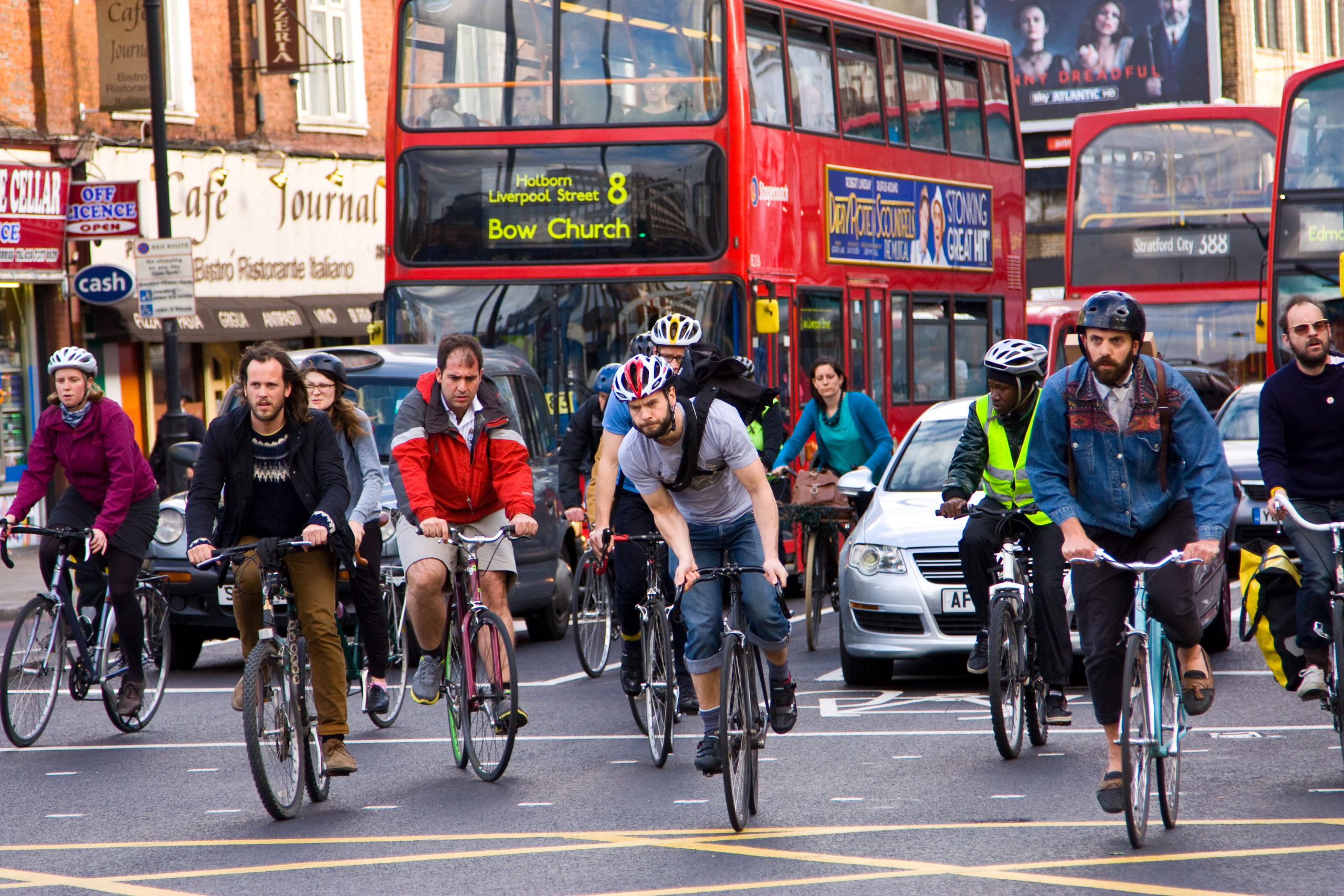Helpful tips for new cycle communters

With many Brits still working from home, we haven’t really been thinking that much about cycling to work. But with the government now suggesting healthy workers make their way into work, for many, cycle commuting is suddenly very appealing. In this new reality where our feelings towards air quality, health, and spatial awareness are heightened, the benefits of cycle commuting have been thrust into the limelight.
There are huge benefits to health beyond the immediate reductions in risk of transmission, of course. If more commuters choose sustainable ways of travelling to work, it will help to improve the air quality of our horribly polluted cities. In turn, this exercise will help the population to get fitter and improve our immune systems, leaving us better equipped to tackle future health crises.
The benefits do not just include physical health. Your mental wellbeing is also improved by the often-cathartic nature of cycle commuting. Starting your day out in the fresh air exploring your surroundings can go a long way to improving your work satisfaction. Similarly, it may well make you a more productive worker. Having an active brain thanks to the morning commute will have you raring to go and make you less reliant on uppers like caffeine.
But for beginners, the idea of cycle commuting can all be pretty daunting. In today’s blog, we take a look at some useful tips that can help beginners get into cycling to work and ensure they stay in the saddle when things return to normal.
You can never be ‘too’ waterproof
It may not seem like torrential rain is a reality as most of the UK enjoys glorious early summer conditions, but British weather makes fools of us all. Sometimes it’s just not worth taking the risk and there’s no such thing as ‘too’ waterproof. You should always side with kit such as jackets, bag covers, waterproof trousers, bike bags etc. that are tried and tested to be completely waterproof. There are no winners if you turn up soaked through with soggy spare clothes and wet paperwork. Don’t worry, you’ll have predicting the weather down to a fine art fairly quickly.
Don’t commute in your favourite kit
No matter how tempting it is, it’s probably not a great idea to wear your ‘Sunday best’ cycling kit on a commute. The road grit, weather and fumes will slowly but surely destroy your best jerseys and shorts. Come on, that kit’s for the weekend when you want to get out in the sun on quiet lanes.
Dress practically
Instead, wear kit that is practical for the conditions you ride in and the surfaces you ride on. If you have a long commute, wear cycling kit that will be comfortable, is practical and will help your efforts. If your commute is off-road, wear kit that you don’t mind getting dirty. No lycra? No problem. If you have a city-centric commute route, ride to work on an e-bike, or catch a train en route, you can get away with commuting in your standard work clothes.
Leave spares at work
It is good to get into the habit of leaving integral kit at work. This means saving some drawer space for spare lights, locks, shoes and pants (that last one is especially important). You may already store a spare tie or coat at work anyway, so just add to the workplace wardrobe over time. You don’t get caught short having left for work, bleary eyed in the early hours of the morning without a pair of pants or a lock for the other end. You may never have to delve into your rescue drawer, but it’s nice to know it’s there.
See…
The two fundamentals of riding in the dark are to see and be seen. No matter the time of day (or year), always remember to take your lights with you. Even riding with lights on during the day can help to make you feel safer and will hand no excuses to other particularly aggressive road users if an incident were to occur.
…and be seen
Then of course you want to be seen too. This means a powerful rear light to show other road users where you are, reflective kit and a reflective cover for your rucksack if you commute wearing a bag. It is particularly important to remember the “see and be seen” mantra in the winter months when the light goes earlier in the day. Even if you’re leaving work early, there is a risk you can get caught out.
Do a dry run
Doing a recce of your route prior to your first commute is advised. Doing a dry run on the weekend will mean there’s fewer time constraints and competing road users, which in turn means there’s less pressure on you, the rider. Take it at an easy pace and learn the route and its landmarks so that you have it engrained in your head before your first commute proper.
Set achievable goals
Everyone rides at their own pace, so it is important to find your level and set realistic goals for yourself. If you live close to your workplace, start by riding directly to it but over time if you start to enjoy your rides more and more, integrate a loop into the commute. If you live far way and a round trip bike ride is a tall order, park and ride or catch a train to a point where you feel comfortable.
The important thing is to ride a distance that is doable for you. The same goes with commute frequency. Start by riding maybe once or twice a week before building up to three times a week and eventually every day. Don’t be put off by commuters who ride thirty plus kilometres every day, you may well get there eventually. Cycling is a community and any ride day is a good day to be part of it.
Learn the basics of bike maintenance
Staying on top of basic bike maintenance will make your life easier and get the most out of your bike. Don’t be late to work because of a puncture, carry your equipment with you and learn how to mend an inner tube on the go. Look after yourself and your bike, after all it could be your new best bud.
Strategise clean up time
There’s nothing worse after a commute, for both you and your co-workers, than sitting down at your desk covered in sweat. However, we understand that workplace facilities can often be inadequate. If you have a long, strenuous commute, you should factor in ample time to have a shower before work. Yes, it might seem odd at first, but if more people begin to commute with you, it will just become part of the workplace culture. Keep a small chamois towel or lightweight camping towel at work with so that you can dry yourself off quickly with a towel that doesn’t take up too much draw/bag space.
Use a reliable bike
Get to work on old faithful. Just like there’s little point commuting in your best cycle kit, there is little value in riding in on your best bike each day. It too will be damaged, and its components worn out quickly by the road grit and water in which it will inexorably become caked. Instead, build up a commuter bike with robust tyres and rugged mudguards. Ride something that does the job and doesn’t necessarily draw attention to itself.
Invest in a good lock
Bike theft is one of the main things that detracts people from cycling to work. Therefore, invest in a secure lock – or a couple of them. Learning how to secure your bike properly with two locks and a cable greatly decreases the risk of bike theft. Even if you’re leaving your bike at work in a private place, a sturdy lock is still recommended as you just never know what may happen. Be cautious and stay one step ahead of any would-be thief.
Prepare the night before
Another useful routine to get used to is preparing your kit, bike and work clothes the night before. This way you reduce the amount of morning panic and can get everything you need for the next day ready and waiting for you. It’s very easy to leave the house a little drowsy without any of the things you actually need for work, like shoes. Or your laptop. We’ve certainly had examples where members of the Yellow Jersey team have spent the day in their bib shorts because they forgot a pair of clean pants.
Eat well during the day for the ride back
Cycling every day can be strenuous so make sure you get your at-work nutrition sorted. This way you will be properly fuelled for the cycle home. Eat slow release snacks, energy bars, fruit and porridge at work rather than raiding the vending machine. These last two points may well make you a better worker too, as you’re less likely to snack on unhealthy treats throughout the day, making you less compulsive and more productive.
Be confident
It is always worth keeping in mind that you deserve to be on the road as much as any other commuter, be confident in yourself, know your rights, use hand signals and ride with respect by following the rules of the road. You may well see other commuters ride a tad more aggressively but it’s not worth the risk.
Find what works for you
At the end of the day, commuting is different for every rider. Be a role model and inspire others to join you so that they can share in the physical and mental benefits of cycling to work.
Commuting to work by bike can be an incredibly cathartic experience that becomes a crucial aspect of your lifestyle. By doing your bit and joining the cycle commuter community you will be able to see the benefits for yourself. The future is bright, healthy, clean and full of bikes. We just need everyone’s help to get there.
Have you got any useful commuter tips? Share them with us on social media!






